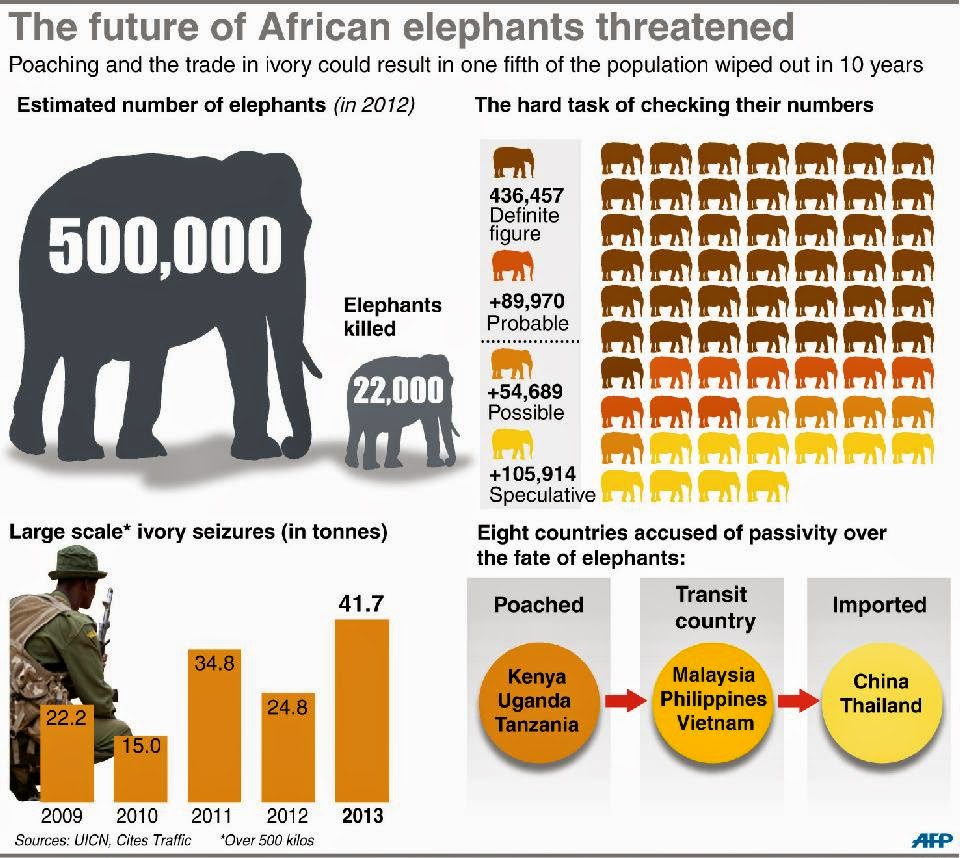Yahoo – AFP,
Kerry Sheridan, 6 Aug 2014
 |
Elephants
graze in a marsh on October 8, 2013 at Amboseli National Park
in Kenya (AFP
Photo/Tony Karumba)
|
Washington
(AFP) - Those who want to protect elephants and rhinoceroses in Africa often
face dangerous criminal traffickers who are bold, enterprising and
well-equipped, leaders said at the US-Africa summit this week.
For that
reason, some African heads of state appealed for more helicopters to protect
wildlife ranges, and sophisticated scanners for inspecting cargo for hidden
tusks and horns that can sell for more than gold.
But during
a discussion on wildlife trafficking, leaders also acknowledged that ending the
demand -- primarily from Asia -- for rhino horn and elephant ivory is key.
 |
Park ranger
Stephen Midzi patrols a
section of Kruger National Park, in
northern South Africa, scouting for
possible poachers on July 31,
2014 (AFP Photo)
|
"Today
rhinos are often poached from helicopters by teams with sophisticated
communications," he said at a panel discussion with the leaders of
Tanzania, Namibia and Togo, along with US Interior Secretary Sally Jewell.
The four
African leaders, while not necessarily at the epicenter of the poaching crisis,
swapped stories about how they had become engaged in a problem that is only
getting worse.
Last year,
some 20,000 elephants were slaughtered in Africa, outpacing their birthrate,
while in South Africa alone, 1,004 rhinos were killed, for a rate of about
three per day, said Jewell.
"This
hugely profitable illicit activity generates billions of dollars in revenue
every year, fueling growth in international criminal syndicates and reversing
decades of hard-won conservation gains across the continent," she said.
The trade
has taken some leaders by surprise, including President Faure Gnassingbe of
Togo who recounted how he learned last year that a shipment of 1,000 elephant
tusks from Togo had been stopped in Malaysia.
"I was
really surprised because we don't have that many elephants," he said.
When more
tusks originating from Togo were stopped in Hong Kong, he realized the problem.
They were being trafficked through his tiny West African nation, home to about
seven million people and just over 800 elephants.
A search
for the criminal led to an arrest of a man who was found with 700 kilograms
(1,500 pounds) of elephant tusks, he said.
 |
Park rangers patrol a section of Kruger
National Park, in South Africa, scouting
for possible poachers on July 31, 2014
(AFP Photo)
|
Adding helicopters, drones, and security forces to the nation's wildlife reserves could help, but only if matched by efforts to quelch demand in Asia, he said.
"If you are able to stop the market for ivory and rhino horns, definitely you will be able to save these species," he said.
But doing
that remains a challenge. Ivory markets in China and Thailand are thriving, and
in nations like Vietnam and China, ground rhino horn is highly prized for its
supposed medicinal effects, including the belief it can cure cancer.
Richard
Haas, a retired US diplomat and a board member of Conservation International,
said both sides are gaining in tools and technology.
"While
capacity is growing on the side of the good guys, capacity is also growing on
the side of the poachers. And for every bit of progress one also gets the sense
that there are some setbacks," Haas said.
Haas asked
the African leaders what kinds of incentives they could offer Asian governments
to reduce the ivory and rhino horn demand, but none offered any specifics.
"To
talk to the Chinese is something we have done," said the president of
Gabon, describing how he broached the topic once with a Chinese official, whom
he did not name.
 |
Last year,
some 20,000 elephants were slaughtered in Africa, outpacing their
birthrate,
while in South Africa alone, 1,004 rhinos were killed, for a rate of about
three per day (AFP Photo)
|
After
listening to the official describe the importance of pandas in China, he asked
what would happen if Africans began propagating the myth that panda hair was
good for fertility, and a trafficking onslaught against pandas ensued?
He said the
Chinese official looked at him with astonishment.
"And I
said, 'You know we feel exactly the same way about our elephants and rhinos.'
He understood."
Asked why
certain nations were present but not others, an official said the four leaders
chosen for the panel represented different regions of Africa with distinct
views on the problem and the actions being taken.
"Having
governments at high-level meeting saying, 'This is a problem,' is not going to
solve anything. But it is a step in the right direction," Sue Lieberman,
executive director for conservation policy at The Wildlife Conservation
Society, told AFP.
Lieberman
said three things need to stop: the killing on the ground, the trafficking and
the demand.
"We
need everything. We need to be strategic about it. It is not always about
high-tech toys."


No comments:
Post a Comment